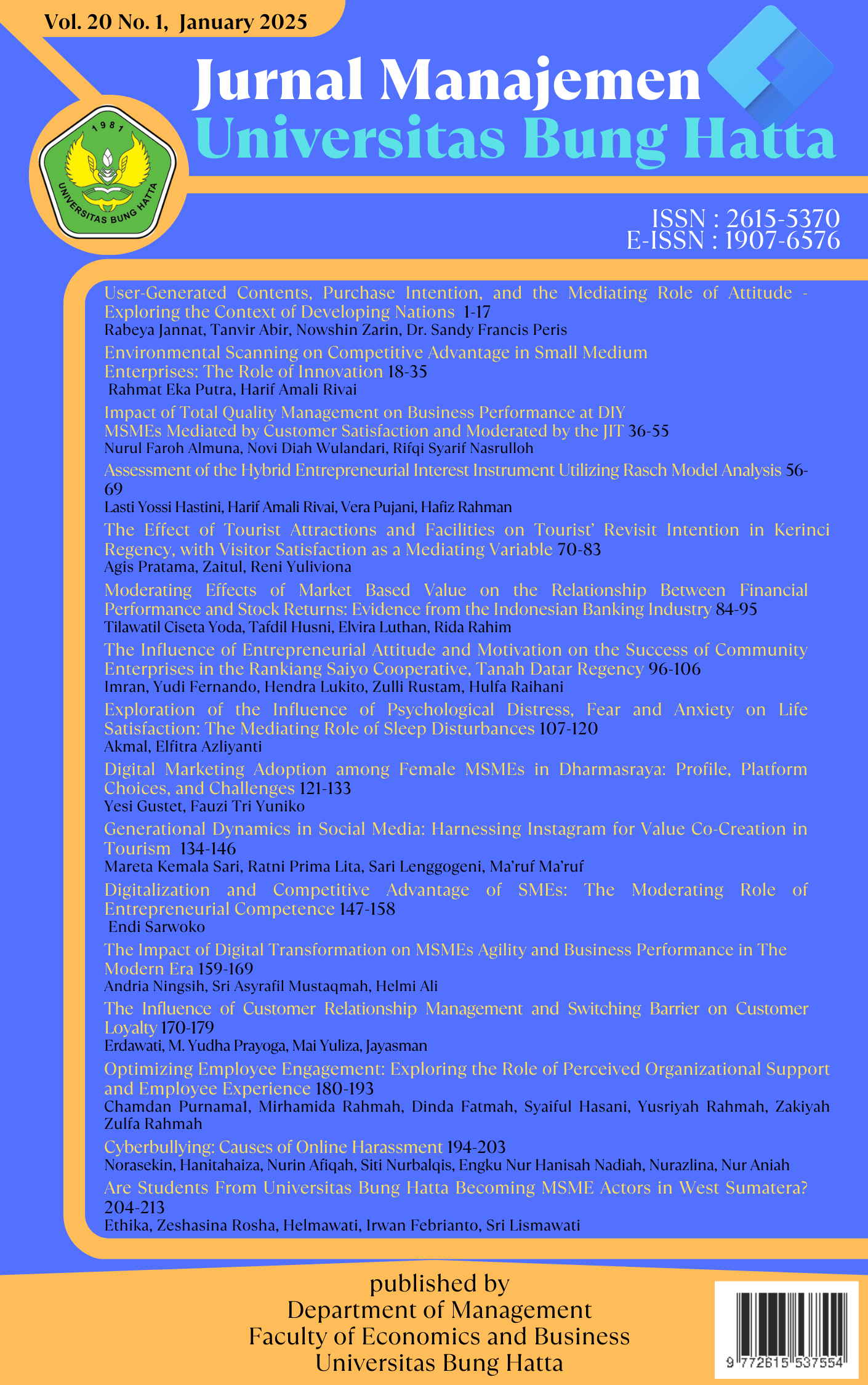The Impact of Digital Transformation on MSMEs Agility and Business Performance in The Modern Era
DOI:
https://doi.org/10.37301/jmubh.v20i1.27091Abstract
Digital transformation has become a key driver of business development in the modern era, especially for Micro, Small, and Medium Enterprises (MSMEs). In West Sumatra, despite numerous challenges in adopting technology, digitalization offers significant opportunities to enhance organizational agility and business performance. This study aims to examine the impact of digital transformation on business agility and business performance in the modern era. Digital transformation is a crucial factor driving organizational change, improving operational efficiency, and increasing competitiveness. The study uses a sample of 120 MSMEs from various sectors in West Sumatra. A Structural Equation Modeling (SEM) approach with Partial Least Squares (PLS) analysis was used to assess the relationships between digital transformation, business agility, and performance outcomes. The research results show that changes in information technology have a positive and significant influence on organizational performance. There is a significant positive relationship between changes in information technology and MSME business performance. Organizational performance has a positive and significant influence on MSME business performance. Business performance plays an important role as an intermediary between changes in information technology and MSME business performance in West Sumatra.
References
Aziz, M. Bin, Hosain, S., Dhar, S. R., Hossain, M., & Noor, S. K. (2024). Online Marketing : Social Media Influencer ’ s Impact on Shopping Tactics in the United States. 1545–1561. https://doi.org/10.4236/ajibm.2024.1411078
Bendig, D., Wagner, R., Piening, E. P., & Foege, J. N. (2023). Attention To Digital Innovation: Exploring the Impact of a Chief Information Officer in the Top Management Team. MIS Quarterly: Management Information Systems, 47(7), 1487–1516. https://doi.org/10.25300/MISQ/2023/17152
Gavril, R. M. (2019). THE IMPACT OF DIGITAL TRANSFORMATION ON STRATEGIC BUSINESS. 8(1).
GEORGE WESTERMAN, DIDIER BONNET, A. A. M. (2023). Elements of Digital Transformation. Elements of Digital Transformation, 1–328. https://doi.org/10.1201/9781003390893
Groenewald, C. A., Groenewald, E., Uy, F., Kilag, O. K., Rabillas, A., & Cabuenas, M. H. (2024). Organizational Agility: The Role of Information Technology and Contextual Moderators-A Systematic Review. International Multidisciplinary Journal of Research for Innovation, Sustainability, and Excellence (IMJRISE), 1(3), 32–38.
Hendrawan, S. A., Afdhal Chatra, Nurul Iman, Soemarno Hidayatullah, & Degdo Suprayitno. (2024). Digital Transformation in MSMEs: Challenges and Opportunities in Technology Management. Jurnal Informasi Dan Teknologi, 6, 141–149. https://doi.org/10.60083/jidt.v6i2.551
Juwita, D., & Handayani, A. N. (2022). Peluang dan Tantangan Digitalisasi UMKM Terhadap Pelaku Ekonomi di Era Society 5.0. Jurnal Inovasi Teknologi Dan Edukasi Teknik, 2(5), 249–255. https://doi.org/10.17977/um068v2i52022p249-255
Kraus, S., Durst, S., Ferreira, J. J., Veiga, P., Kailer, N., & Weinmann, A. (2022). Digital transformation in business and management research: An overview of the current status quo. International Journal of Information Management, 63(August 2020). https://doi.org/10.1016/j.ijinfomgt.2021.102466
Lei, D., & Slocum, J. (2020). C hapter 1 C rafting a S ustainable B usiness S trategy. Demystifying Your Business Strategy, 13–26. https://doi.org/10.4324/9780203109007-5
Maijanen, P. (2020). Managing Digital Transformation. In Media Management Matters. https://doi.org/10.4324/9780429265396-13
Mubarak, M. F., Shaikh, F. A., Mubarik, M., Samo, K. A., & Mastoi, S. (2019). The Impact of Digital Transformation on Business Performance A Study of Pakistani SMEs. Engineering, Technology and Applied Science Research, 9(6), 5056–5061. https://doi.org/10.48084/etasr.3201
Pranoto, H., Soetedja, V., Paramitha, T. M., & Wibowo, A. (2023). Service Quality Influence on Repurchase Intention, Through Customer Satisfaction Mediation: Indonesia Music Studio Perspective. Jurnal Aplikasi Bisnis Dan Manajemen, 9(3), 706–715. https://doi.org/10.17358/jabm.9.3.706
Pratamansyah, S. R. (2024). Transformasi Digital dan Pertumbuhan UMKM : Analisis Dampak Teknologi pada Kinerja Usaha Kecil dan Menengah di Indonesia. 2(2), 1–17.
Rachmawati, M. (2024). THE USE OF DIGITALIZATION OF INFORMATION IN DEVELOPING DIGITAL MARKETING FOR MSMEs. Edusight International Journal of Multidisciplinary Studies, 1(1). https://doi.org/10.69726/eijoms.v1i1.8
Roldán, J. L., Felipe, C., & Leal-Rodríguez, A. L. (2016). Information systems capabilities and organizational agility: understanding the mediating role of absorptive capacity when influenced by a hierarchy culture. September. https://doi.org/10.3990/2.332
Roman, A., & Rusu, V. D. (2022). Digital Technologies and the Performance of Small and Medium Enterprises. Studies in Business and Economics, 17(3), 190–203. https://doi.org/10.2478/sbe-2022-0055
Sidabutar, A., & Siswanto, J. (2024). The Impact of Digital Transformation in Food and Beverage Sector SMES: The Role of Leadership and Organizational Agility. E3S Web of Conferences, 484. https://doi.org/10.1051/e3sconf/202448401017
Teece, D. J. (2018). Business models and dynamic capabilities. Long Range Planning, 51(1), 40–49. https://doi.org/10.1016/j.lrp.2017.06.007
Tobgye, S. (2018). Digital transformation in Bhutan: Culture, workforce and training. 430. https://eprints.qut.edu.au/115459/
Zhang, H., Ding, H., & Xiao, J. (2023). Cómo la agilidad organizacional promueve la transformación digital: Un estudio empírico. Sostenibilidad, 15(14). https://www.mdpi.com/2071-1050/15/14/11304%0Ahttps://doi.org/10.3390/su151411304
України, Е. І. (2024). Руслана Степанівна ЛУЦІВ. 5517(477), 18–22.
Downloads
Published
Issue
Section
License
Copyright (c) 2025 Andria Nining; Sri Asyrafil Mustaqmah, Helmi Ali

This work is licensed under a Creative Commons Attribution-ShareAlike 4.0 International License.
Authors who publish with Jurnal Manajemen Universitas Bung Hatta agree to the following terms:
- Authors retain copyright and grant the journal right of first publication with the work simultaneously licensed under a Creative Creative Commons Attribution-ShareAlike 4.0 International License that allows others to share the work with an acknowledgement of the work's authorship and initial publication in Jurnal Manajemen Universitas Bung Hatta.
- The author holds the copyright of the submitted and published articles, with the understanding that articles are disseminated under the Creative Commons Attribution-ShareAlike 4.0 International License..
- The editor team is entitled to do the editing in accordance with the guidelines for writing or template in the Jurnal Manajemen Universitas Bung Hatta.
This work is licensed under a Creative Commons Attribution-ShareAlike 4.0 International License.












